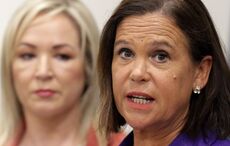Northern Ireland has been without a government for 1,000 days, costing taxpayers nearly $126.5 million (£100m).
Stormont collapsed in January 2017 over a renewable heating scandal, and in the following two years, the Democratic Unionist Party and Sinn Féin have remained at a stalemate in talks to resume government. One of the biggest hurdles to the restoration of power-sharing is a dispute over an Irish language act.
Read More: Sinn Fein rejects DUP leader Arlene Foster’s bid to end Stormont impasse
According to leading economist Dr. Esmond Birnie, $3.79m (£3m) a month was being spent on Assembly members' wages, expenses, and the operational costs of running the building and other staff during the impasse.
The Belfast Telegraph reports that MLAs received full pay until last November when their salaries were reduced by 15 percent. An additional cut has brought salaries down to $45,400 (£35,888).
Leaders from both parties have voiced skepticism that they could break the political stalemate, leaving a major obstacle to a possible Brexit deal, The Guardian reports.
Ulster Unionist leader Robin Swann said the inability of the DUP and Sinn Féin to share power is a complete failure of politics: "Their toxic mixture of arrogance, disrespect and incompetence has led the country to where it is today.”
SDLP leader Colum Eastwood said: "The cold truth is that we are no closer to Irish language legislation now than we were three years ago.
"We are facing a national emergency on this island as a no-deal Brexit draws nearer.”
Naomi Long, the leader of the Alliance party, called the political impasse “shameful.”
"Over the last almost three years, we have seen the already often fractious relationship between the two biggest parties become even further damaged due to lack of respect, bad attitudes and a seeming unwillingness to resolve the issues on the table."
Meanwhile, the Belfast Telegraph asked its readers to share what they had achieved in the two years since Stormont’s shutdown.
Belfast City Council SDLP councillor Carl Whyte became a father and was elected in May's local elections since the 2017 collapse. His two-year-old daughter Stephanie has lived her entire life without a government in place.
"It's a daily reminder to me that the length of time just gets longer and longer," he said.
"Part of the reason I ran for election is because I was always involved in politics and I remember thinking to myself that when my child was born I wouldn't be interested any more because I would be focusing on her.
"It actually made me even more angry about the way things were because when you have a child, your stake in society changes and you start thinking about the place where your daughter is growing up and hopefully flourishing."
Read More: Irishman walks 90 miles in protest of two years without Northern Irish government
Roisin Foster, the chief executive of Cancer Focus Northern Ireland, said that in the past 1,000 days, the charity has supported 15,500 local people affected by cancer, provided 11,000 counseling sessions, supported 664 children whose parent has cancer, and answered 5,500 NurseLine calls.
Many more readers responded that since Stormont’s shutdown, they graduated from university, traveled, got married, bought houses, or had children.




Comments